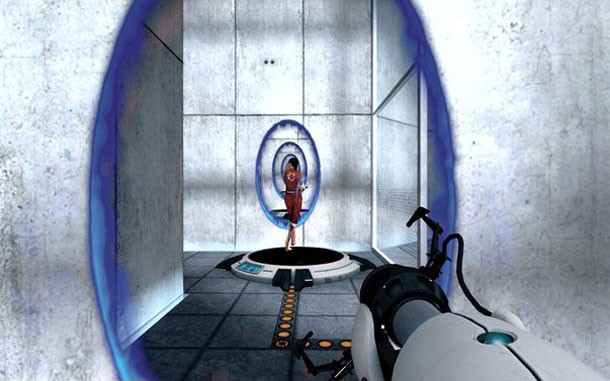Games To Beat In A Day – Portal

Valve's Portal is one of the greatest feats of game design of the last decade. It's also a testament to the power of brevity.
Portal was a unique game. It started as a student project entitled Narbacular Drop, which had the now-iconic "portal" gameplay but lacked in storytelling, polish, and presentation. Valve head Gabe Newell was so impressed by the core design concepts that he hired the team, including producer Kim Swift, and had them develop a new project based on Narbacular Drop.
Eventually, this project evolved into Portal. It came out to little notice; a curio tacked on to Valve's Xbox 360 release The Orange Box, which was highly anticipated for containing a next-gen console port of Half-Life 2 and the new Team Fortress 2. However, after people began to see what Portal was all about, it started to gain steam, becoming a cult hit.
The genius of Portal is the way the game let you learn through experience rather than beating you over the head with its concepts. At first, it was mystifying. You'd shoot two portals next to each other and back in and out, watching your image in the other portal. For a while, even the relatively easy test chambers would require some thought, as you had to overcome the training and expectations you'd built through years of in-game platforming. In Portal, it wasn't matter of performing tricky action sequences, it was about recognizing the elements in the room that you could exploit to your advantage. From a simple concept (go in one portal and out the other), the development team weaves a tapestry of amazing action puzzles.
However, there was more to the game than just the ingenious puzzle design. While, on its surface, Portal was a sterile, minimal experience, a intriguing story soon developed, told only through the placid voice of your A.I. companion GLaDOS. The way the game develops GLaDOS echoes the way it introduces new gameplay concepts; it's a gradual build that moves the character from the banal to downright menacing over the course of the game.
At first GLaDOS comes off as a simple A.I. with little personality, about as distinctive a personality as Apple's Siri. However, as the game progresses, her directives begin to take on a disturbing tone. At times, she seems infatuated with you. Other times, needy and hurt. Worse yet, a malevolent edge starts to surface, as she tells lies that might have ended in your death. If you haven't played the game, I won't spoil it, but end sequences of Portal are unforgettable and concludes with one of the best musical moments in gaming history.
All of this speaks to the developers' considerable talents, but I also feel that Portal's brevity (it can be completed in three to four hours in most cases) contributed to its effectiveness. There are no throwaway moments in Portal; every bit of dialogue or puzzle seems necessary. The minimalist storytelling also benefits from not having to stretch the experience out over a dozen hours or expansive cutscenes. Portal 2, which was longer and in many ways a more complex game, was amazing in its own right, but I feel as though it suffers in comparison to the short, sharp shock that is the original.
Portal is one of the greatest games ever made - and it is likely one of the shortest games among our collection of games you can beat in a day. If you haven't played it before, I recommend you do. If you start now, you could have it done in time to fix lunch - be sure to have some cake for dessert.
To read more about games you can beat in a day, check back at our hub over the course of the day.

Get the Game Informer Print Edition!
Explore your favorite games in premium print format, delivered to your door.
- 10 issues per year
- Only $4.80 per issue
- Full digital magazine archive access
- Since 1991









